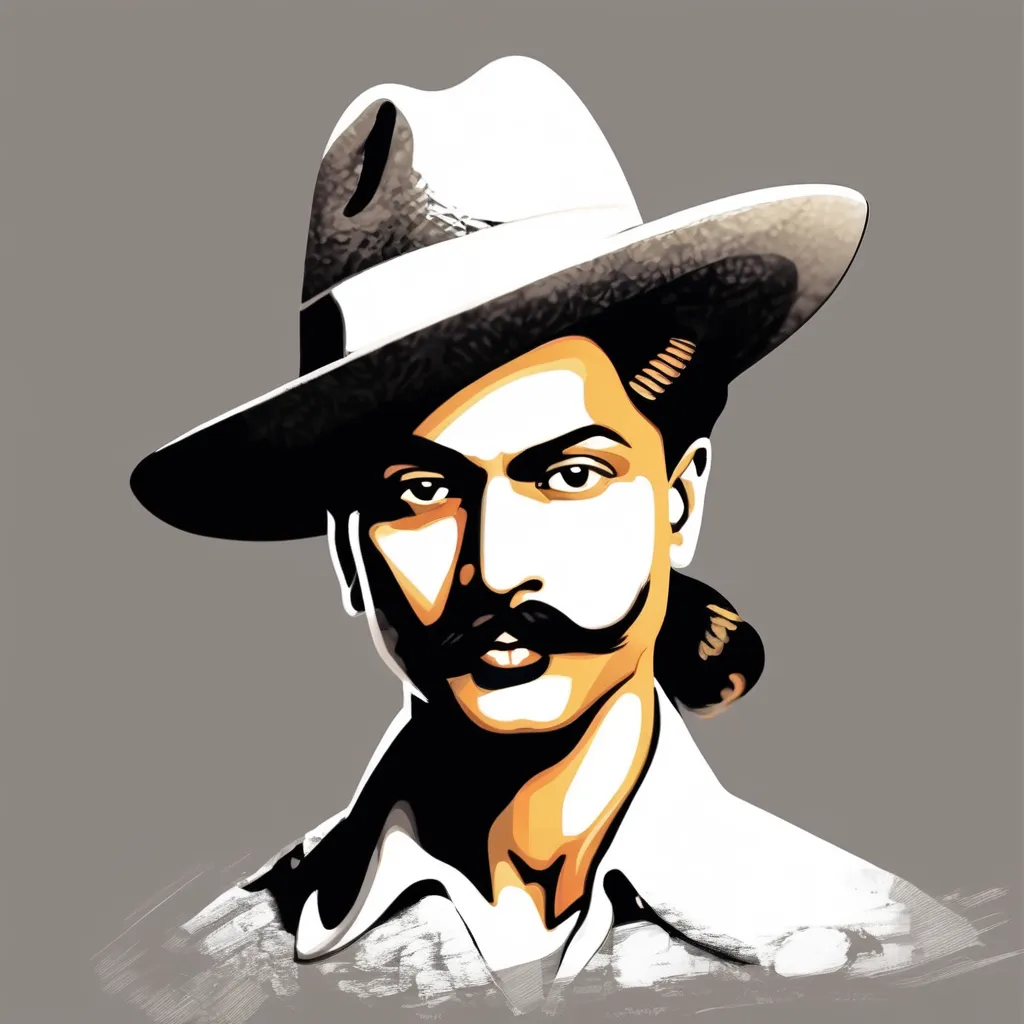
Bhagat Singh, one of India’s most revered freedom fighters, is a symbol of courage, patriotism, and the quest for justice. Born on September 28, 1907, in Banga, Punjab, Singh’s life was marked by an unwavering commitment to the cause of Indian independence from British colonial rule. His revolutionary ideas and fearless actions continue to inspire generations, making him an enduring figure in the annals of Indian history.
Early Life and Influences
Bhagat Singh was born into a Sikh family with a long tradition of political activism. His father, Kishore Singh Sandhu, and uncle, Ajit Singh, were both involved in the freedom struggle, which profoundly influenced the young Bhagat. Growing up amidst the turmoil of the Indian independence movement, Singh was deeply affected by the Jallianwala Bagh massacre in 1919, an event that heightened his awareness of the oppressive nature of British rule.
As a teenager, Singh was an avid reader, devouring literature on revolutionary movements and socialism. He was particularly inspired by the writings of Marx, Lenin, and the Indian revolutionary leaders of his time. This intellectual foundation equipped him with a critical understanding of social injustices and the necessity for armed struggle against colonial oppression.
Revolutionary Activities
In 1926, at the age of 19, Singh joined the Hindustan Socialist Republican Association (HSRA), a group dedicated to overthrowing British rule through revolutionary means. His involvement with the HSRA marked the beginning of his active participation in the freedom struggle. Singh was known for his charisma and leadership skills, quickly rising to prominence within the organization.
One of his most notable actions was the assassination of British police officer John Saunders in December 1928. This was a calculated response to the death of Lala Lajpat Rai, a prominent leader who was injured during a protest against the Simon Commission. Singh, along with his associates, mistakenly targeted Saunders, believing him to be the officer responsible for Rai’s death. This act of defiance marked a pivotal moment in Singh’s life and the struggle for independence.
The Assembly Bombing
In April 1929, Bhagat Singh and his comrade Batukeshwar Dutt carried out a daring act of rebellion by throwing non-lethal bombs in the Central Legislative Assembly in Delhi. Their intention was not to cause harm but to make a statement against repressive laws and to promote the cause of freedom. After throwing the bombs, they willingly surrendered, using the trial as a platform to propagate their revolutionary ideals.
During the trial, Singh and Dutt made headlines by refusing to defend themselves on the grounds of legal propriety, choosing instead to advocate for their cause. They were vocal about the injustices faced by the Indian populace, transforming the courtroom into a stage for their revolutionary message. Singh famously stated, “Revolution is not a bed of roses. It is a struggle between the future and the past.”
Imprisonment and Hunger Strike
Bhagat Singh was sentenced to death for his involvement in the assassination of Saunders and the bombing in the assembly. While in prison, he undertook a hunger strike to protest the inhumane treatment of political prisoners. His resolve and commitment to the cause drew significant attention and support from the public, amplifying his status as a martyr for the freedom movement.
Singh’s hunger strike lasted for 116 days, during which he fought for the rights of prisoners, advocating for humane treatment and better living conditions. His determination captured the hearts of millions across India and became a rallying point for the freedom struggle.
Legacy and Martyrdom
On March 23, 1931, Bhagat Singh, along with his comrades Rajguru and Sukhdev, was executed in Lahore Central Jail. Their deaths were met with widespread protests and outrage, further igniting the passion for independence among the Indian populace. Singh’s martyrdom turned him into a legend, and his ideals continued to resonate long after his death.
Bhagat Singh’s legacy is multifaceted. He is remembered not only as a revolutionary leader but also as a thinker who articulated a vision for an egalitarian society. His writings and ideas on socialism and justice influenced many future leaders and activists. Singh’s commitment to the cause of the oppressed transcended religious and regional boundaries, making him a unifying figure in the struggle for freedom.
Cultural Impact
Bhagat Singh’s life and ideals have inspired countless works of art, literature, and cinema. His story has been portrayed in numerous films, books, and plays, ensuring that his contributions to the independence movement are not forgotten. His image adorns posters and murals across the country, serving as a reminder of the sacrifices made by countless individuals for India’s freedom.
In contemporary India, Singh’s legacy is invoked in discussions about social justice, equality, and nationalism. His revolutionary spirit continues to inspire youth movements and activists who strive for a more just and equitable society. Many view him as a symbol of resistance against tyranny, making him relevant to various struggles around the world.
Slogan By Bhagat Singh: “Inquilab Zindabad”
Meaning: Translated, it means “Long Live the Revolution!”
Significance:
- Call for Change: The slogan encapsulates the spirit of revolution and the demand for radical change in society. It emphasizes the need to overthrow colonial rule and address social injustices.
- Unity and Resistance: “Inquilab Zindabad” became a rallying cry for freedom fighters, symbolizing unity among those fighting against oppression.
- Legacy of Rebellion: It reflects Bhagat Singh’s belief in the power of the masses and the importance of collective action in the struggle for justice and equality.
Conclusion
Bhagat Singh’s life was a testament to the power of conviction and the relentless pursuit of justice. His courage in the face of oppression and his unwavering commitment to the cause of freedom have left an indelible mark on Indian history. As we reflect on his achievements, it is essential to recognize the values he stood for: courage, sacrifice, and the pursuit of a just society. Bhagat Singh remains a beacon of hope and inspiration, urging us all to stand against injustice and fight for the rights of the oppressed. His legacy lives on, reminding us that true patriotism involves not just love for one’s country but also a commitment to justice and equality for all its people.




I¦ve learn some just right stuff here. Certainly price bookmarking for revisiting. I surprise how much attempt you place to create such a wonderful informative site.
http://www.tlovertonet.com/